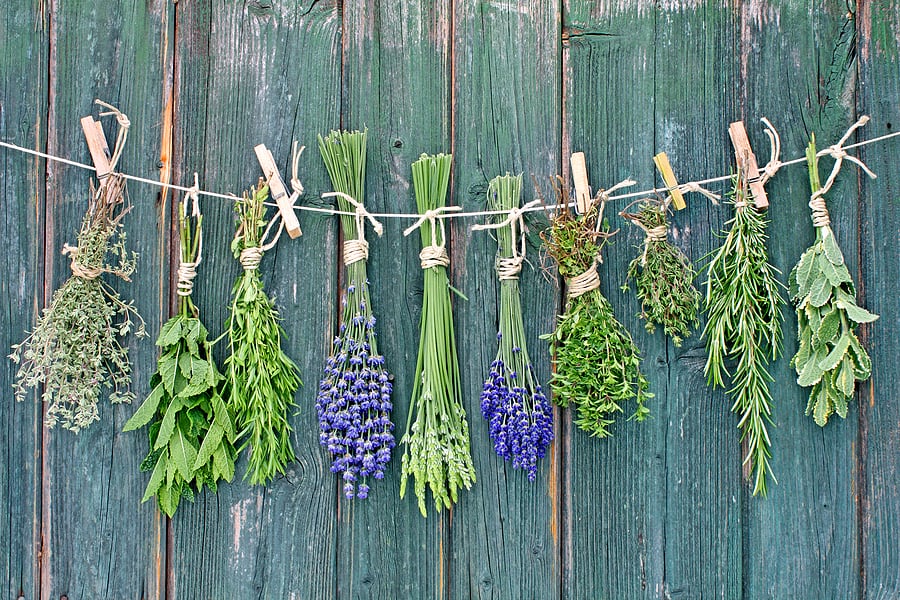By Lindsay Campbell
Take a look at this cheat sheet from Penn State University on herb flavor profiles. This will be a helpful tool if you’re feeling adventurous and want to experiment with pairing different plants together.
Herb-Infused Oil
As a general rule, the more herbs you use, the stronger the flavor of the oil will be. We recommend filling the jar about halfway with plants of your choice. While olive oil seems like the obvious choice as your base, avocado or grapeseed oils are suitable as well. Before adding herbs to the oil, wash them and ensure they’re dry. Any moisture creates the possibility of bacteria brewing.
You’re also going to want to place your herbs in a sterilized container and cover them with the appropriate amount of room-temperature oil. During this process, make sure you’ve fully covered your herbs with more than an inch of oil. Stir to release any air bubbles and put a lid on the jar or bottle. After two to three weeks, your infused oil will be complete and you can remove the herbs from the oil.
Herb Paste
Herb pastes make for a great marinade on meats or vegetables, can be mixed into hummus or spreads, and provide an easy way to season soups and sauces. To make an herb paste, separate the leaves of your herbs from the stems and place them into a food processor. Pulse until they are chopped finely. If you don’t have a food processor, a knife and cutting board work just as well.
If you’re using a food processor, slowly add olive oil until the texture gets to a paste-like consistency—just as you might while making fresh pesto. If you’ve opted for a knife and cutting board, throw your finely chopped herbs into a bowl and mix in the olive oil as needed.
Your paste should last around two weeks if you choose to keep it in the refrigerator. You can also freeze your paste on a pan lined with parchment paper, in an ice cube tray, or in airtight containers or Ziploc bags to preserve it for longer.
Herb Ice Cubes
Freezing your herbs in ice cubes can provide an easily rationed portion for recipes months into the future. It’s important to note that even if they are limp when defrosted, the herbs’ flavor won’t be compromised.
First, rinse your herbs and pat them dry. Then, depending on whether you plan to use the herbs in a drink or in a recipe, decide how finely you want to chop them. For dressing up a cocktail, we suggest using larger clippings, but if your intent is to eventually use them for flavor in a recipe, coarsely chopped is best.
Once the herbs are clipped or chopped, add them to an ice tray or mold. Pour enough water on your herbs so that each cube is filled about one-third to the top. Put them in the freezer and check on them after about an hour has passed.
Herb-Infused Vinegar Blends
Red wine vinegar, white wine vinegar, apple cider vinegar, or rice vinegar are all great options. Stay away from balsamic vinegar, as its flavor will be too overpowering. If you’re looking for something less acidic and more complimentary to your herbs, we suggest you start with rice vinegar or white wine vinegar.
Unlike many of the other preservation methods, you don’t need to chop up your herbs. Feel free to use them on their stalks or stems, but make sure you have sanitized your herbs and your canning jars before you start the process. We recommend a one-to-two ratio of herbs to vinegar.
Prior to mixing, you’re going to want to heat your vinegar to a temperature that is just below boiling point (190°F-195°F). You can then pour your vinegar over your herbs and any other ingredients, leaving about a quarter of an inch from the top of the jar.
Store your herb-infused vinegar at room temperature for about three to four weeks to allow the flavors to develop.
Dried Herbs
Tie your herb stems in bunches with some string and hang them upside down in a warm, dry place. As the days pass and your herbs start to shrink in volume, you’ll likely need to tie the string tighter or use a twist tie to tighten the grip of the string. It takes on average about four to five days for the herbs to completely dry out. You can then shake out the herbs into a bag and separate the leaves from the stems.
After drying, store them in jars in a cool, dark place. Dried herbs keep for about six months before their flavor starts to lose its intensity.
(Courtesy: Modernfarmer.com)












